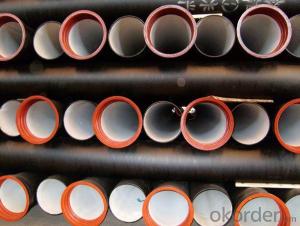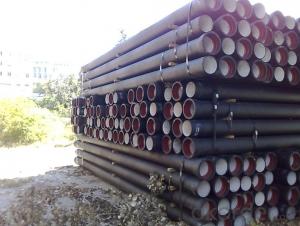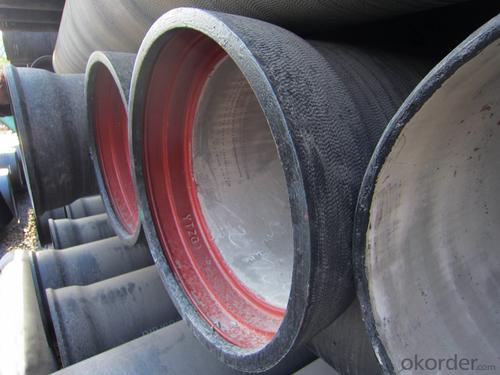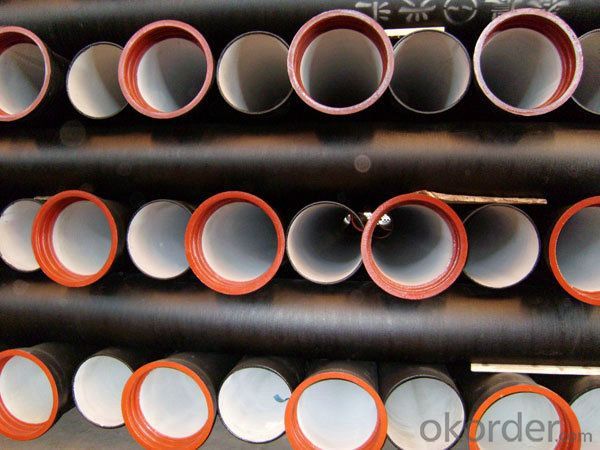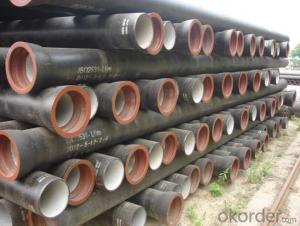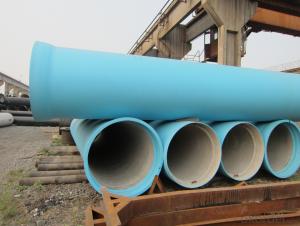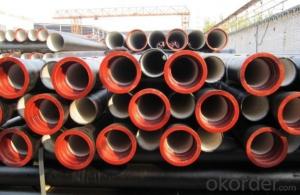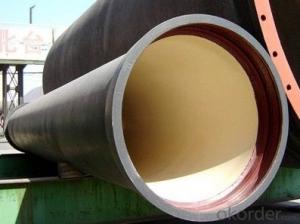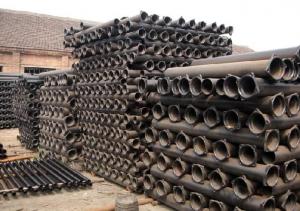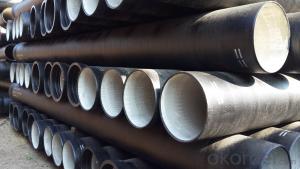Ductile Iron Pipe of China DN400-DN900 EN545 Factory Quality
- Loading Port:
- China main port
- Payment Terms:
- TT or LC
- Min Order Qty:
- 22 m.t.
- Supply Capability:
- 200000 m.t./month
OKorder Service Pledge
OKorder Financial Service
You Might Also Like
1. Ductile Iron Pipe Description:
1) Pipes confirm to ISO2531,K9 class,T type joint,6m long,with inside cements lining conform to ISO4179, outside Zinc spraying(130g/m2) and bitumen coating(70μm) conform to ISO8179.
2) Pipe ends: Spigot and socket ends, with 100% SBR rubber gaskets accoding to ISO4633
3) we can do third party inspection according to customer's request.
4) Our products have been sold to many international market, such as Middle East and South East Asia and Africa.
2. Main Features of the Ductile Iron Pipe:
1).Quality guarantee
• Chemical checking
• NDE after rough machining
• Mechanical testing after heat treatment
• Final NDE,dimension inspected
2).Quality document
• Full Q.A document as per client request
3).Packing and Shipping
• standard export package(carton/wooden case/pallet)
• accept FOB,FAS,CNF,CIF door to door etc or customer designated shipping agent
4). Length: 6m or cut into 5.6m, 5.7m, 5.8m
5). Internal Lining: Cement, conform to ISO4179
6). External coating: Zinc + Bitumen, conform to ISO8179
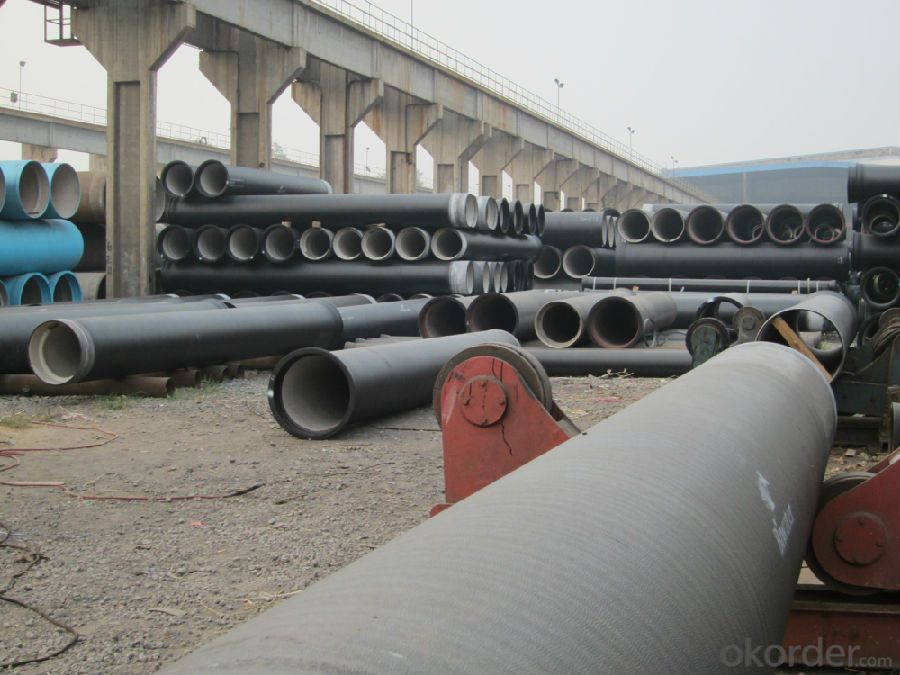
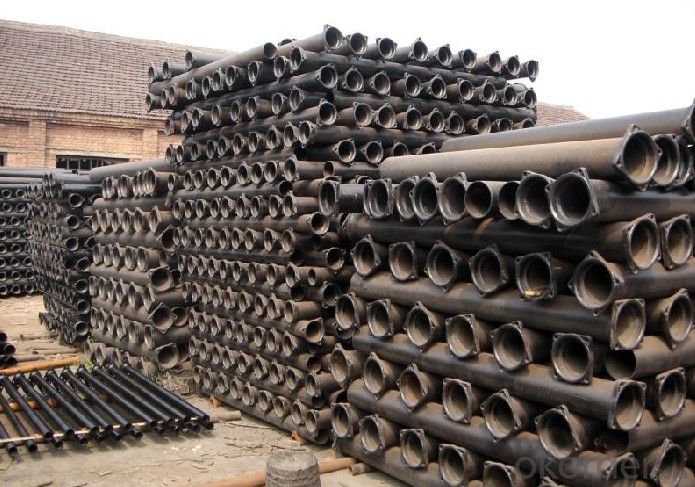
4. Ductile Iron Pipe Specification:
Additional Services: Internal Coating
Packaging: packed in bag, plastic bag, steel strip, steel wire,double wire, iron box, wooden box, tarpaulin, plastic sheeting
Inspection: MOODY SGS BV GL DNV ABS LIOYD’S
Test: X-ray, UT, magnetic particle,inspection,hydrostatic test.
Processing service: Beveling, Threading, Slotting, Cut-to length, Bends, Quench and Temper, Fabrication, Double-jointing and On-site assistance
Documentary: MTC, material certification,Origin certification, CI or PI,Test Report, export licence, handling order, B/L,insurance policy,shipping instructions, contract, packing list etc.
Gasket: 100% SBR/NBR/EPDM rubber gasket in accordance with ISO4633.
5. FAQ:
We have organized several common questions for our clients,may help you sincerely:
1. Q: Why would you choose ductile iron pipe rather than other pipe materials?
A:The reasons are obvious for that not only ductile iron pipe possesses the inherent strength and flexibility of ductile iron, combined with proven corrosion protection systems, but also the cost savings can be achieved from design to installation and commissioning.
2. Q:Why can you guarantee the inner of pipes can’t be corroded?
A: High alumina cement mortar lining and sulphate-resistant cement mortar lining. These two special linings are applicable to inner anti-corrosion for sewage pipes, improving resistance to erosion of the sewage components.
- Q: Will the cast iron pipes rust?
- Qualified ductile iron pipes can be used for more than a hundred years. The main place where rust is easily exposed is where the outer wall meets the soil because of its high humidity and high oxygen content. Qualified anticorrosion can effectively resist rust, its process principle can not give you the details. Although the wall has a long flow of water, but oxygen scarce, compared with the outer wall is not easy to corrosion, but there is cement lining is necessary.
- Q: Can ductile iron pipes be used for oil and gas pipelines?
- Yes, ductile iron pipes can be used for oil and gas pipelines. Ductile iron is known for its durability, strength, and corrosion resistance, making it suitable for transporting oil and gas. Its high tensile strength and ability to withstand pressure and extreme temperatures make it a reliable choice for these applications.
- Q: Are ductile iron pipes suitable for use in desalination plants?
- Ductile iron pipes are indeed suitable for use in desalination plants. Desalination plants are facilities that remove salt and other impurities from seawater, turning it into fresh water for consumption or industrial use. These plants require a reliable and durable piping system to transport the treated water to various destinations. Ductile iron pipes are known for their strength, flexibility, and corrosion resistance, making them an ideal choice for desalination plants. These pipes are made from a form of cast iron that has been treated with magnesium to enhance its properties. This treatment gives ductile iron pipes a high tensile strength, allowing them to withstand the high pressures associated with the desalination process. Additionally, desalination plants often use chemicals and other treatment methods to remove impurities from the water. Ductile iron pipes have excellent resistance to corrosion from these chemicals and can withstand the harsh conditions found in desalination plants without deteriorating over time. This ensures the longevity and reliability of the piping system, minimizing the risk of leaks or failures. Furthermore, ductile iron pipes have a smooth internal surface, which helps to minimize friction and pressure loss as water flows through the pipes. This feature is especially important in desalination plants, where efficiency is crucial for the overall operation of the facility. The smoothness of ductile iron pipes allows for efficient water flow, reducing energy consumption and optimizing the desalination process. In conclusion, ductile iron pipes are suitable for use in desalination plants due to their strength, flexibility, corrosion resistance, and smooth internal surface. These pipes provide a reliable and durable piping system that can withstand the high pressures, harsh chemicals, and demanding conditions found in desalination plants.
- Q: Are ductile iron pipes resistant to alkaline attacks?
- Generally, ductile iron pipes have resistance against alkaline attacks. Ductile iron is renowned for its durability and ability to resist corrosion, making it suitable for a range of applications, including water and wastewater systems. Certain metals can experience corrosion from alkaline substances, such as high pH levels in water or chemicals. However, ductile iron has been specially engineered to withstand these conditions. Its composition, which includes the addition of alloying elements like nickel and chromium, enhances its resistance to alkaline attacks. Moreover, ductile iron pipes are frequently coated with protective substances like cement mortar or polyethylene, which further increase their resistance against alkaline substances. Nevertheless, it is important to consider that the specific resistance of ductile iron pipes to alkaline attacks can be influenced by various factors, such as the concentration and duration of exposure to alkaline substances, as well as the presence of other corrosive agents. Therefore, it is always advisable to consult with manufacturers or industry experts to ensure the appropriateness of ductile iron pipes for specific alkaline environments.
- Q: What are the recommended bedding and backfill materials for ductile iron pipe?
- The recommended bedding and backfill materials for ductile iron pipe include a combination of granular materials such as sand, gravel, or crushed stone. These materials provide support and stability to the pipe, ensuring proper alignment and preventing damage during installation and operation. For bedding, a layer of sand is typically used to create a uniform and level surface for the pipe to rest on. This helps distribute the load evenly along the pipe's length and reduces the potential for stress concentration. Backfill material is used to fill the remaining space around the pipe once it is properly bedded. It is crucial to select a material that offers good compaction and drainage properties to prevent settling and potential damage to the pipe. Commonly used backfill materials include crushed stone or gravel, which provide stability and allow for proper compaction. It is important to follow the recommendations of the pipe manufacturer and any relevant industry standards when selecting bedding and backfill materials for ductile iron pipe. These materials should meet the specified size and quality requirements to ensure the long-term performance and durability of the pipe system. Additionally, local regulations and soil conditions should also be taken into consideration when determining the appropriate bedding and backfill materials for ductile iron pipe installations.
- Q: What is the expected thrust restraint method for ductile iron pipes?
- Typically, to achieve the expected thrust restraint for ductile iron pipes, mechanical joint restraints are employed. These restraints are designed to counteract the axial forces or thrust caused by the fluid pressure within the pipe. Thrust blocks, tie rods, and harness restraints are the most commonly used types of mechanical joint restraints for ductile iron pipes. Thrust blocks are concrete structures strategically placed around the pipe joints to resist the thrust forces. They are typically constructed at bends, tees, and other directional changes to prevent pipe movement. Tie rods, on the other hand, are another frequently used method of thrust restraint. These involve steel rods that are anchored to the pipe and securely fastened to an immovable structure to counter the thrust forces. Harness restraints, however, are constituted by a series of steel rods or cables that encircle the pipe and are anchored to the ground on both sides. These restraints effectively distribute the axial forces along the pipe's length, preventing movement and ensuring stability. The choice of a specific thrust restraint method for ductile iron pipes may vary depending on various factors such as pipe diameter, fluid pressure, soil conditions, and local regulations. It is vital to consult industry standards, engineering guidelines, and local authorities to determine the appropriate thrust restraint method for a particular application.
- Q: What is the ductile cast iron pipe
- Have not heard of the nodular cast iron pipe pipe, ductile iron may be a tube or a certain short tube is referred to as excellent grade.
- Q: What is the weight of ductile iron pipes?
- The weight of ductile iron pipes can vary depending on their size, thickness, and length. Typically, ductile iron pipes can range from a few pounds to several hundred pounds per linear foot.
- Q: How does ductile iron pipe compare to steel pipe in terms of durability?
- Ductile iron pipe and steel pipe both have their own unique characteristics, but in terms of durability, ductile iron pipe has several advantages over steel pipe. Firstly, ductile iron pipe is highly resistant to corrosion. It has a protective layer of zinc or cement lining that prevents rust and corrosion, making it more durable and less prone to leaks or failures. On the other hand, steel pipe is susceptible to corrosion, especially when exposed to moisture or certain chemicals. This can lead to structural issues and decrease its overall durability. Secondly, ductile iron pipe has excellent impact resistance. It can withstand heavy loads and external pressures without cracking or breaking. This makes it suitable for applications in areas with high traffic or where the pipe may be subject to accidental impacts. Steel pipe, although strong, can be more brittle and prone to fractures under similar conditions. Additionally, ductile iron pipe has a longer service life compared to steel pipe. It has been known to last for over 100 years with proper maintenance, making it a reliable and durable choice for infrastructure projects. Steel pipe, while still durable, may require more frequent inspections and maintenance to ensure its longevity. Overall, ductile iron pipe surpasses steel pipe in terms of durability due to its corrosion resistance, impact resistance, and longer service life. However, the choice between the two ultimately depends on the specific application, budget, and other project requirements.
- Q: What are the advantages of using ductile iron pipe over HDPE pipe?
- Ductile iron pipe offers numerous benefits compared to HDPE pipe. Firstly, it is renowned for its exceptional strength and durability. With the ability to withstand higher pressure, it is less prone to leakage or bursting, making it an ideal choice for applications requiring high-pressure water or gas transmission, such as municipal water supply systems or industrial piping networks. Secondly, ductile iron pipe boasts an extended lifespan when compared to HDPE pipe. Its remarkable resistance to corrosion allows it to endure for decades, even in harsh environmental conditions. As a result, frequent replacements are minimized, leading to long-term cost savings. Furthermore, ductile iron pipe exhibits excellent fire resistance properties. It can endure high temperatures without compromising its structural integrity, making it a reliable option for applications where fire safety is a concern, such as fire hydrant systems or sprinkler systems. Additionally, ductile iron pipe is renowned for its superior flow characteristics. Its smooth inner surface reduces friction loss, facilitating efficient and consistent fluid flow. This attribute is particularly crucial in applications that necessitate maximum flow capacity, such as water distribution systems or wastewater treatment plants. Moreover, ductile iron pipe is highly recyclable, promoting environmental sustainability. It can be melted down and utilized to manufacture new pipes, thereby reducing its environmental impact. In conclusion, ductile iron pipe offers a multitude of advantages over HDPE pipe, including its exceptional strength and durability, prolonged lifespan, fire resistance, superior flow characteristics, and recyclability. These features establish ductile iron pipe as the preferred choice for various applications, particularly those that require high-pressure transmission, longevity, fire safety, efficient flow, and environmental sustainability.
Send your message to us
Ductile Iron Pipe of China DN400-DN900 EN545 Factory Quality
- Loading Port:
- China main port
- Payment Terms:
- TT or LC
- Min Order Qty:
- 22 m.t.
- Supply Capability:
- 200000 m.t./month
OKorder Service Pledge
OKorder Financial Service
Similar products
Hot products
Hot Searches
Related keywords

